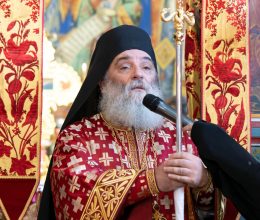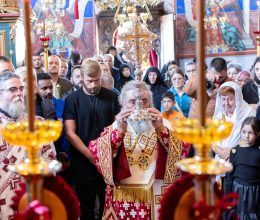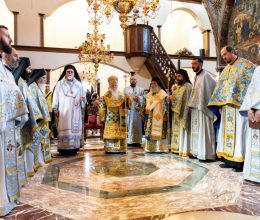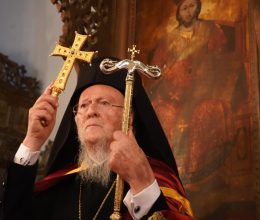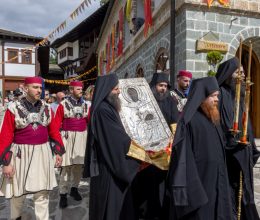Chanting and rejoicing, giving gratitude and praising – this is how Bigorski celebrated his glorious Patron, his protector and heavenly interceder, the Holy and honourable Prophet, the Forerunner and Baptist of our Lord, John. His miraculous icon and the holy relics in the richly adorned and flowery church in Bigorski, release graceful cent, bringing joy to everybody who visits his sacred home on the slopes of Bistra, nourishing and bringing peace to the souls of the inhabitants and visitors. Vast multitude of people came to the 1000 years old century of St. John, to honour and celebrate and to pray to receive great gifts from the “earthly angel and heavenly man”, the miracle-working Baptist of our Lord. The monastic community under the paternal care of our beloved Elder, bishop of Antania and Abbot of the Bigorski Monastery, Parthenius, invested themselves with the greatest care and dedication in the preparations for the celebration of “the greatest of those born by a woman”. They celebrate him as an example of monastic life and feat and its protector and the voice from the desert calling: “Repent!”. This fiery preacher of God at the Jordan River, the one who revealed and baptized the Lamb of God and who was beheaded for the sake of truth, was celebrated with a whole night vigil in our holy Monastery.
The spiritual rejoicing and excellence were increased by the presence of our most respected guests: the representative of the Ecumenical Patriarchate in Constantinople, the great preacher of the glorious Church of Christ, Archimandrite Panareth Psaravtis, as well as, our years-long friend and brother from the Greek Church, Archimandrite Mathew Psomas and the representative of Edessa Diocese, the protoplast Archimandrite Cherubim Tsinoglou. His wonderful byzantine choir endowed the vigil with their graceful Athonite byzantine chant.
At the beginning of the vigil, our beloved Elder, bishop Parthenius introduced a profoundly contemplative mode and prayerful expression of gratitude, inspiring the present faithful with his especially touching sermon:
![]()
Your Beatitude, honourable Archimandrite Panareth, from the great Christ’s Church in Constantinople,
Respectable Archimandrites, Mr Mathew and Mr Cherubim, from the fraternal Orthodox Church of Greece,
Honourable fathers, my brothers’ monks and sisters’ nuns,
Beloved faithful and humble venerators of the holy Forerunner,
He that hath the bride is the bridegroom: but the friend of the bridegroom, which standeth and heareth him, rejoiceth greatly because of the bridegroom’s voice: this my joy, therefore, is fulfilled +. These are the words of the one who cries in the desert of this world, our heavenly protector and today’s celebrant, St. John the Baptist, announcing the mysterious wedding of the Bridegroom Christ, with His bride, the Church. Thus today, our joy is also fulfilled because through You, Holy Father Panareth, we received the blessing of the Mother Church, the First-Throned Ecumenical Patriarchate. We all rejoice as its children of the one Christian faith and convey through you our warm gratitude to the Father of all Orthodox, the great and most holy Ecumenical Patriarch, Bartholomew, our evident benefactor, who embraced the Ohrid Archbishopric in the community with the one Chalice of God. In this way, he granted us an equal and equally honourable position of our ecclesiastic entity in the family of all Local Orthodox Churches.

This truth is greater than the light, equally great as the words, feat and the life of the Holy Prophet, the Forerunner and Baptist of God, who, with this martyrdom for the truth, left us an example and testimony, calling us to confess, testify and, if needed, suffer for the sake of Truth. If ye continue in my word, then are ye my disciples indeed; And ye shall know the truth, and the truth shall make you free (Jn 8,31-32) – these are the Divine and sweet words of our Saviour and Lord, Jesus Christ. With these words, He placed the truth as the main principle of knowledge and spiritual freedom. In fact, He Himself is personified Truth: I am the way, the truth, and the life – says He in His holy Gospel.
And it was this exact personalized Truth which incarnated and become human in order to transform the deceived and delusional humankind that St. John the Baptist was the Prophet and Forerunner to. Therefore, the Divine Fathers, also call him “the teacher of truth”. But where did this Prophet of God learn and how did he learn so much as to become the most respected teacher who was visited by both learned and ignorant, respectable and unknown, honourable and sinners? Which university did this wise speaker of the Word of God attend? He educated Himself in the most strict and perfect school – the university of the desert. By depriving himself of everything earthly and purifying himself from all the passions and earthly attachments, this “desert bird” flew up freely to the realms of Divine wisdom and collected knowledge from above, so that he could foretell and reveal the Lamb of God, which taketh away the sin of the world.
Thus, St. John became a participant in the mysteries of God and its direct preacher. He summed up the entire knowledge he attained in the desert, away from the vanity of this world, his revelations from the conversations with the angels and the huge experience of his strict ascetic life, as well as the fruit of his prayers, into a very simple, but powerful short sentence with which he led his people to the knowledge of God: Repent ye: for the kingdom of heaven is at hand (Mt. 3,2).
The repentance is the main motive and the coming of the Heavenly Kingdom, i.e., the Son of God on Earth as indisputable truth, is the foundation and practical goal of St. John’s preaching. Repentance – taken as a change of mind, change of the way of thinking; transfer from life in darkness towards the light, from melancholy to hope, from despair to joy; the Heavenly Kingdom as the living presence of the Word of God among the people. Thus, the “teacher of truth”, the “earthly angel and heavenly man”, exclaiming this short and evident sentence, strongly supported by his immaculate life, proved himself to be the preacher of joy in Christ, because where there is repentance, that’s where you will find the Kingdom, i.e., the King Christ; where Christ is, their joy resides. That is why, when St. John saw the One, he prophesied about, he exclaimed that finally, his greatest joy is fulfilled.
From this aspect, the Baptist of Christ develops the theology of spiritual joy and rejoicing of the inner self, which comes from the closeness and friendship with Christ. Such elevated theology is the basis of Christian existence, so, the main book of the Christian revelation is called Good news – Gospel. To us, the monks, this Divine knowledge represents our very life. The repentance and experiencing the Kingdom of God as preached by the “close friend of Christ”, which the holy author refers to as St. John, are the two legs with which the monk constantly presses toward the mark for the prize of the high calling of God in Christ Jesus (Phil. 3,14). That is why St. John is presented as the protector and a true paradigm of angelical monastic existence. “The Holy Forerunner”, says the blessedly-reposed Elder George Kapsanis, “is the first monk of the Church and a prototype and example for every true monk in his feat, in the love he had for Christ, but also in the spirit of his sacrifice by which he extinguished himself. Therefore, we should have him constantly before our eyes, so that we could have the courage, inspiration and strength to strive every day in our spiritual and monastic feat”.
Thus, my beloved monks, nuns and faithful, let us embrace the example of the loving sacrifice for the truth, left to us by our dear St. John and rush towards the blessed ascetism in the name of God. In this way, we could also taste the inexplicable spiritual sweetness and joy of the Heavenly Kingdom, actually of our Lord, Jesus Christ, Who is Himself the Kingdom of peace and joy. The conformism, carnal pleasures and luxury in which today’s society lives have a devastating effect and completely ruin the spirit of modern man. Therefore, he is less and less capable to experience the feeling of inner joy and the breathing of freedom as opposed to apathy, melancholy and despair. This fact pronounces, even more, the call of St. John the Baptist for repentance, balanced ascesis and fruitful self-discipline, leading to a new prayerful life.
I wish you all a good vigil, graceful experiences and prayers so that the voice of the Forerunner could resound in the desert of our hearts and turn them into an oasis of love and spiritual joy, thus becoming places of rest and peace of the souls of our neighbours.
Amen.
![]()
In his reply, the Most Reverend Archimandrite Panareth, who came to our feast with a group of 50 Slavic faithful of Constantinople, conveyed, to our great joy and honour, the greetings and the blessing of his All-Holiness, the Ecumenical Patriarch Bartholomew:
Your Eminence, Bishop of Antania, Parthenius,
Honourable brothers and fathers of this Holy Monastery,
Brothers and sisters in Christ,
We came from the martyred Phanar, from the First-Throned Church of Constantinople, to convey the paternal prayerful greetings and patriarchal blessing of our Ecumenical Patriarch. We came to venerate, to co-celebrate, to commune with the one Chalice, the one Body of Christ. We came with a Slavophonic parish community which includes Russians, Ukrainians, Georgians, Moldavians and Caucasians in its flock. The reason we came is that we know how hard it is to be lonely and isolated in one place; so, we came to commune together and to get to know you, and for you to get to know us, wishing you many years to come.
As a memory of our visit, we present You with this enkolpion, wishing You years-long archiereic service in this monastery. For many years to come!

Later on, the choir of the above parish from Constantinople chanted in Church-Slavonic greetings to our Elder, who wholeheartedly thanked them and the most respected Father Panareth, presenting him with a gift of an archimandrite cross made on the occasion of the 1000 jubilee of the Bigorski Monastery.(Свети Теодор Студит)
